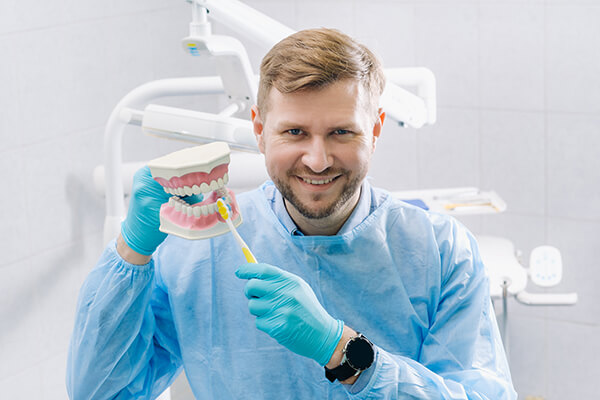Why You Must Choose a Regional Dentist Eugene for Personalized Treatment
Why You Must Choose a Regional Dentist Eugene for Personalized Treatment
Blog Article
An Overview to Usual Oral Conditions That Require a Dentist's Treatment
Toothaches, for example, can be symptomatic of severe concerns such as cavities, split teeth, or abscesses, each calling for details interventions like dental fillings or root canals. Influenced knowledge teeth and jaw problems can introduce substantial discomfort and difficulties.
Toothaches
Toothaches are a typical oral problem that can vary from moderate discomfort to extreme discomfort, often indicating an underlying problem that calls for expert interest. This pain can come from a range of sources, consisting of dental cavities, fractured or fractured teeth, and dental abscesses. Each of these problems positions considerable dangers if left without treatment, possibly resulting in a lot more extreme problems.
Dental dental caries, also recognized as decays, are triggered by the build-up of plaque that deteriorates tooth enamel, leading to openings or pits in the impacted teeth (dentist eugene or). Split or fractured teeth, on the other hand, may result from injury, grinding, or biting right into tough items. These architectural damages can expose the delicate internal layers of the tooth, triggering acute pain and increasing the risk of infection. Abscesses are uncomfortable infections at the root of a tooth or between a tooth and the periodontal, normally resulting from severe degeneration or without treatment tooth cavities.
Reliable treatment of toothaches involves addressing the origin. This might include dental fillings for cavities, crowns for split teeth, or root canals and antibiotics for abscesses. Very early treatment by a dental specialist can avoid more wear and tear and minimize discomfort, guaranteeing ideal dental health and wellness.
Gum Tissue Disease
Periodontal disease, a common yet frequently forgotten oral condition, shows up through inflammation and infection of the periodontals and sustaining tissues. This problem largely takes place in two phases: gingivitis and periodontitis. Gingivitis, the milder type, offers with symptoms such as red, inflamed gums that may hemorrhage easily throughout brushing or flossing. If left neglected, gingivitis can advance to periodontitis, an extra severe form defined by the damage of the sustaining bone and connective cells, ultimately leading to missing teeth.
The key reason of gum disease is bacterial plaque, a sticky, colorless film that continuously develops on teeth. Poor dental health, smoking cigarettes, hereditary tendency, and particular clinical problems, such as diabetic issues, can worsen the danger of developing gum tissue condition. Regular oral exams are important for early discovery and monitoring of this problem.
Therapy for gum tissue condition ranges from expert oral cleansing and scaling to advanced procedures like origin planing and gum surgical treatment, relying on the severity. Keeping great dental health techniques, consisting of cleaning two times daily, flossing, and using a disinfectant mouth wash, can substantially lower the danger of gum condition and promote healthier gum tissues.
Tooth Cavities
Cavities, also referred to as cavities, are a common dental condition characterized by the destruction of tooth enamel as a result of acid-producing microorganisms in the mouth. These microorganisms grow on sugars and starches from food and drinks, creating acids that gradually deteriorate the enamel, causing cavity development.
Early-stage dental caries might disappoint signs and symptoms, yet as they progress, they can trigger tooth pain, level of sensitivity to chilly or warm, visible openings or pits in the teeth, and discoloration. If left without treatment, dental caries can permeate much deeper layers of the tooth, possibly resulting in serious pain, infection, and also missing teeth.
Protecting against dental caries includes a mix of good dental hygiene techniques and dietary Website habits. Regular cleaning with fluoride toothpaste, flossing, and routine oral exams are vital. Dental practitioners may also advise additional check preventive procedures, such as fluoride therapies and dental sealants, to safeguard teeth from degeneration.
Minor tooth cavities can be addressed with dental fillings, which restore the tooth's structure. More innovative instances might call for crowns or even origin canal therapy if the degeneration has actually reached the tooth's pulp.

Impacted Wisdom Teeth
Impacted wisdom teeth are a widespread oral concern that happens when the third molars, generally described as wisdom teeth, fail to fully emerge or straighten properly within the mouth. This condition commonly arises from not enough space in the jaw or an irregular growth angle of the teeth. Impacted knowledge teeth can lead to a selection of difficulties, including infection, damage, and pain to surrounding teeth.
When wisdom teeth end up being influenced, they are usually partly appeared or continue to be totally under the gum line. This partial eruption can develop a pathway for bacteria to enter the gums, bring about infections that materialize as swelling, pain, and also high temperature. Furthermore, impacted knowledge teeth can exert stress on bordering teeth, possibly triggering crowding or changing.
A detailed click now dental evaluation, normally including X-rays, is vital for detecting affected wisdom teeth. Therapy commonly includes surgical removal, carried out by a dental cosmetic surgeon. The procedure aims to alleviate pain and protect against additional difficulties, such as cysts or damage to bordering bone structures. Post-operative treatment is essential to make certain proper recovery and decrease the risk of infection. Normal dental check-ups are advisable to check the condition and maintain oral wellness.
Jaw Disorders
Jaw conditions, jointly known as temporomandibular joint (TMJ) problems, incorporate a variety of conditions that impact the jaw joint and bordering muscles. These conditions can materialize through signs and symptoms such as pain or tenderness in the jaw, problem chewing, a clicking or standing out audio when opening up or shutting the mouth, and even chronic frustrations. TMJ problems can emerge from various factors, including arthritis, jaw injury, or habitual behaviors like teeth grinding or jaw clenching.
Medical diagnosis of TMJ disorders normally involves an extensive evaluation by a dental practitioner, consisting of a physical evaluation of the jaw, oral X-rays, and often advanced imaging methods like MRI or CT scans to evaluate the joint's condition. Non-invasive techniques such as physical treatment, dental splints, and medications aimed at minimizing swelling and discomfort are often first-line treatments.
Early intervention by a dental specialist is essential to protect against the progression of TMJ conditions and to maintain general dental wellness. Individuals experiencing persistent jaw discomfort or dysfunction must seek prompt analysis and therapy.
Conclusion
Toothaches typically suggest underlying problems such as tooth cavities, fractured teeth, or abscesses, requiring punctual intervention. Influenced wisdom teeth and jaw conditions additionally need expert focus to relieve pain and avoid additional problems.
Dental tooth cavities, likewise recognized as decays, are triggered by the build-up of plaque that wears down tooth enamel, leading to openings or pits in the influenced teeth. Abscesses are excruciating infections at the origin of a tooth or in between the periodontal and a tooth, commonly resulting from severe decay or without treatment tooth cavities.

In addition, impacted knowledge teeth can apply stress on bordering teeth, possibly causing crowding or moving.
Report this page